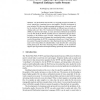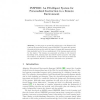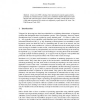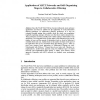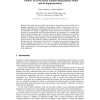142
click to vote
OHS
2001
Springer
15 years 7 months ago
2001
Springer
Abstract. The World Wide Web (WWW) was originally designed to handle relatively simple files, containing just text and graphics. With the development of more advanced Web browsers...
145
Voted
OHS
2001
Springer
15 years 7 months ago
2001
Springer
Abstract. In this paper we present the architecture of an Adaptive Educational Hypermedia System, named INSPIRE. This particular system, throughout its interaction with the learner...
97
Voted
OHS
2001
Springer
15 years 7 months ago
2001
Springer
Despite the fact the hypermedia has long been discussed as a suitable format for academic research publications, the academic community has made little progress toward realizing hy...
112
Voted
OHS
2001
Springer
15 years 7 months ago
2001
Springer
Abstract At last year’s OHS workshop, I have introduced a semiotic approach to hypermedia on a broader basis [11]. This year’s contribution shall be dedicated to (still theoret...
108
Voted
OHS
2001
Springer
15 years 7 months ago
2001
Springer
The work of the Open Hypermedia Systems Working Group (OHSWG) has lead to the creation of several hypermedia models and a common protocol for Navigational Hypertext. However none o...
132
click to vote
OHS
2001
Springer
15 years 7 months ago
2001
Springer
Adaptation/personalization is one of the main issues for web applications and require large repositories. Creating adaptive web applications from these repositories requires to hav...
131
Voted
OHS
2001
Springer
15 years 7 months ago
2001
Springer
This paper introduces an adaptive hypermedia system that provides a means for information providers to direct their users through hyperspace. With our system, the information prov...
113
Voted
OHS
2001
Springer
15 years 7 months ago
2001
Springer
91
Voted
OHS
2001
Springer
15 years 7 months ago
2001
Springer
171
Voted
OHS
2001
Springer
15 years 7 months ago
2001
Springer
This paper presents an XML-based Adaptive Hypermedia Model (XAHM) and its modular architecture, for modelling and supporting Adaptive Hypermedia Systems, i.e. hypertext-based multi...
